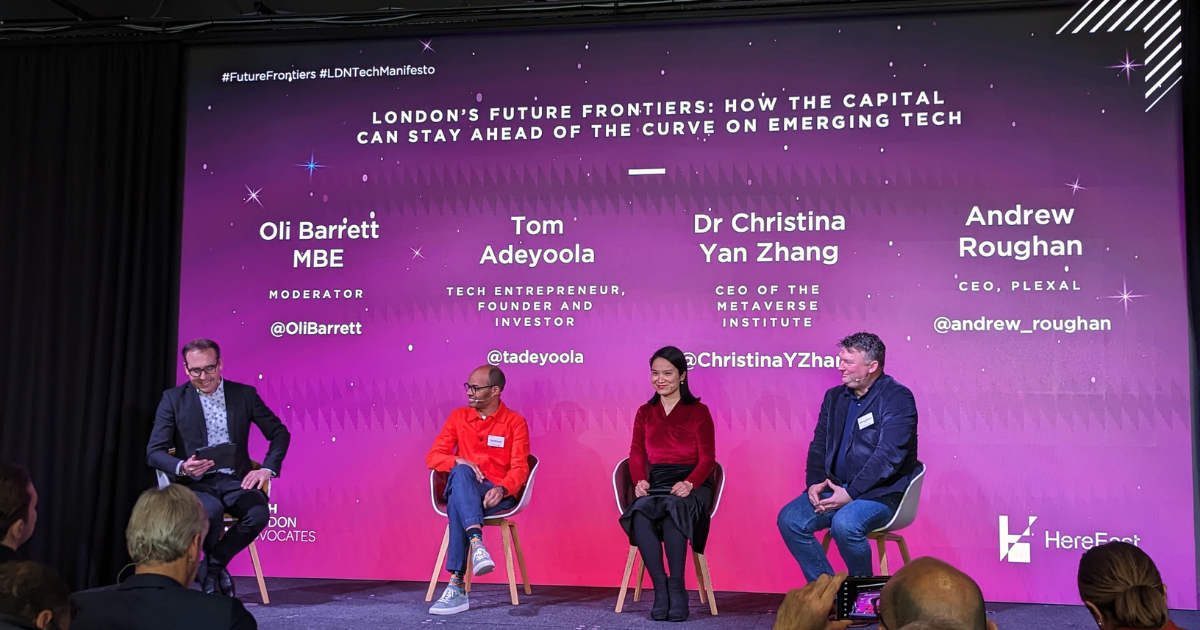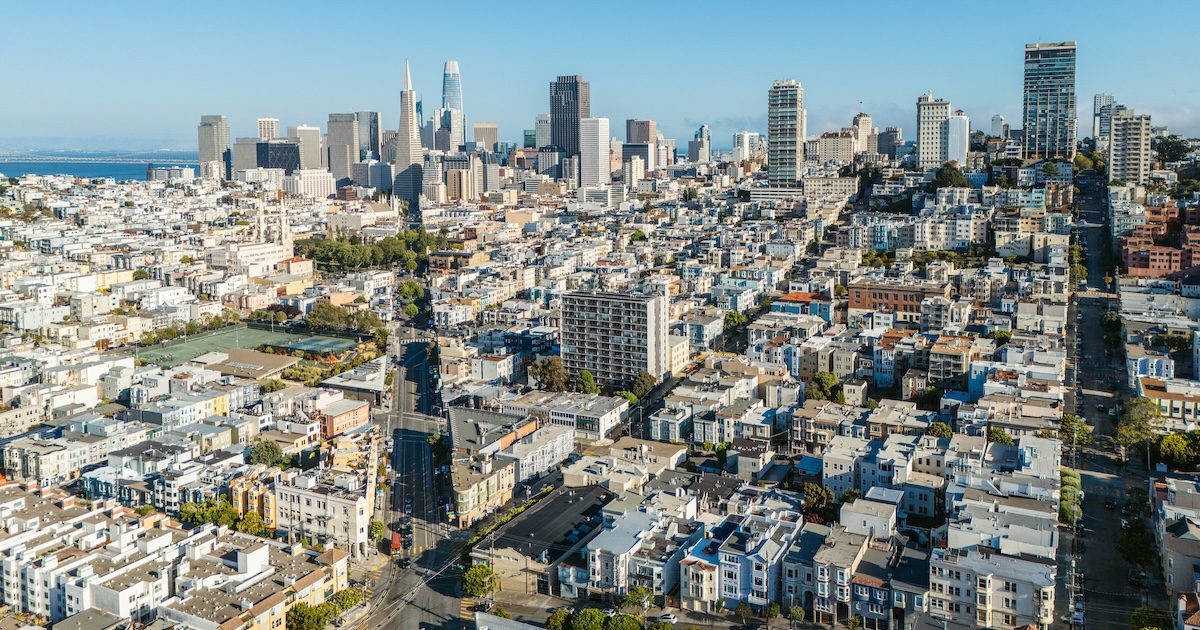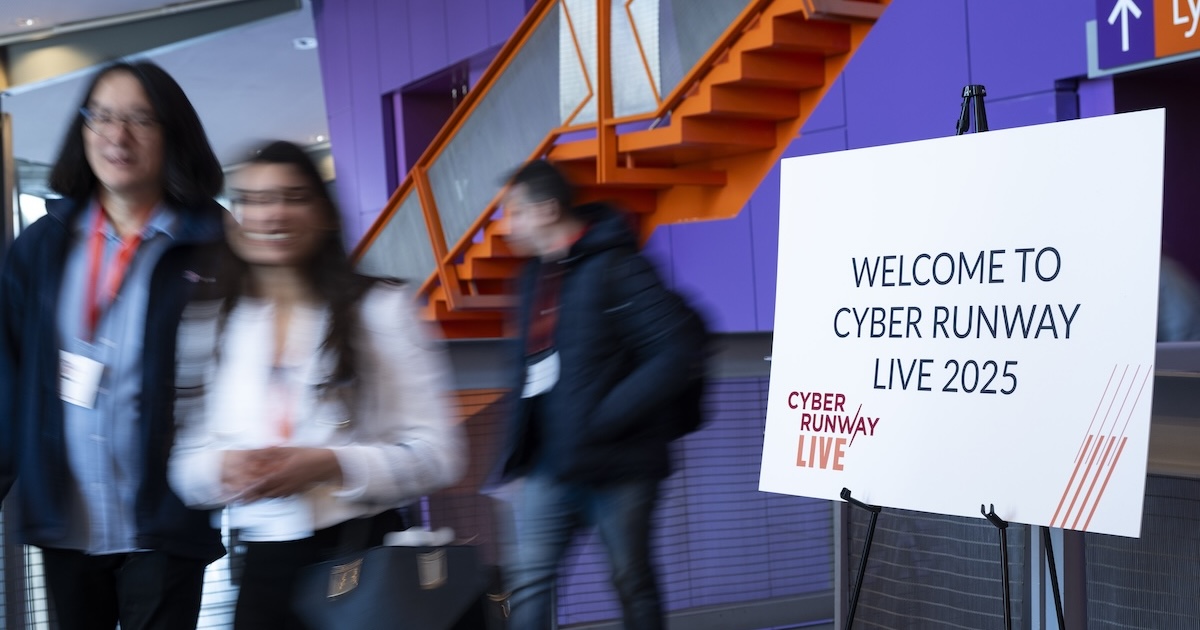A Future Frontiers event held at our Stratford workspace today marks the official release of the Tech Manifesto for London. Arriving ahead of the London mayoral election on Thursday 2nd May, it acknowledges London Mayor Sadiq Khan’s pledges and provides guidance to ensure change for a more impactful collaboration with the private sector, enabling the city’s tech industry to thrive in the years to come.
A publication of eight policy recommendations with the ambition to “secure London’s future as a world-leading international tech hub,” the Tech Manifesto for London was collaboratively developed by Tech London Advocates, which has a membership of 18,000 private tech sector professionals, and Here East, the tech campus where our HQ is based.
The Tech Manifesto for London has an aim of driving growth and prosperity of the UK capital’s tech ecosystem and has the support of Plexal. It aligns with our broader company mission of creating economic growth, prosperity and security within communities across regions nationwide, which sees us closing the gap between organisations so skilled science and technology talent can meet with government, industry and academia.
The eight policy recommendations are summarised as follows:
(1) Develop and revitalise London’s digital talent
Equip Londoners with skills to embrace a new AI and LLM-driven tech environment by investing in programmes and London’s universities for a digitally literate workforce.
(2) Support a balanced and effective regulatory landscape
Support the CMA and CFA in creating an agile regulatory environment that encourages innovation but protects against the dangers of untested emerging technologies.
(3) Bolster London’s world-leading cleantech sector
Position the cleantech sector as one of the first lines of defence against the climate emergency, creating educational programmes to inspire cleantech enthusiasts.
(4) Make the London markets a more attractive place to list
Strengthen London’s listing environment by adopting pro-business initiatives encouraging UK-based businesses to scale at home, fostering an entrepreneur-led environment.
(5) Harness London’s capabilities with emerging technologies
Develop emerging technology capabilities by amplifying the expertise of leading industry groups, building knowledge-sharing bridges between academia and industry.
(6) Improve tech sector diversity and inclusion
Champion initiatives ensuring marginalised groups and those from underrepresented areas can access tech opportunities through skills bootcamps and other programmes.
(7) Connect London with other tech hubs – both domestic and international
Enhance engagement with the wider UK and the rest of the world through trade missions and support for major tech events such as London Tech Week and London Data Week.
(8) Build world-beating 5G and ultra-fast fast fibre networks
Build 5G infrastructure, installing citywide, rather than Zone One-focused, super-fast broadband and ensuring continued funding for the ‘Connected London’ scheme.
Russ Shaw CBE, Founder of Tech London Advocates & Global Tech Advocates, said: “The eight key recommendations to strengthen London’s vibrant tech ecosystem are a launchpad for the future, ensuring the city retains its place as a world-leading tech hub.”
Gavin Poole, CEO at Here East, added: “To achieve this, we need a manifesto not only for the Mayor – but also for the public and private sectors to work together on – to create a pathway to fuel collaboration, innovation and growth across London.”
You can read the Tech Manifesto for London in full here at the Tech London Advocates website.
In addition to Future Frontier acting as the launch platform of the Tech Manifesto for London, the event also comprised panel discussions.
The ‘How the capital can stay ahead of the curve on emerging tech’ discussion saw Plexal CEO Andrew Roughan sit alongside tech entrepreneur, founder and investor Tom Adeyoola and The Metaverse Institute CEO Dr Christina Yan Zhang, with Oli Barrett moderating.
Asked for his position on the current emerging technologies landscape, Andrew said we’re at an interesting moment for four reasons:
(1) “We’re at peak disruption constantly due to the opportunity and risk presented by science and technology, which could never have been higher and will continue to be so furthermore.”
(2) “The geoeconomics of the day requires a desperate need to trade to grow at the same time as building sovereign supply, which means facing that moment around not knowing which way to go or where to invest.”
(3) “We’ve got productivity challenges ahead. Everyone can agree the economy, not least London’s economy, will grow if we can invest in productivity and get our per capita up – but we don’t know how to use the tools to get there.”
(4) “Combined, this paves the way for an opportunity around specificity of intent. Using AI as an example, do we want to be the biggest trader of AI capability in the world? Do we want to be the safest place to adopt AI? Do we want to be the largest exporters of AI? Or do we want AI industries to adopt AI quicker than anyone else and then drive outcomes?”
Concluding his breakdown, Andrew added: “We’re on the cusp of a huge moment here and I think London needs to lead that charge. Now is the time to place bets – we should be very specific about the outcomes we want to drive. For example, making our industries adopt AI quicker than any other country in the world and not worry too much about the sovereignty of technology we’re adopting but focus on the security of it.”
Oli proceeded to ask Andrew’s stance on how to encourage a culture of serendipity and collaboration across such a diverse range of people and organisations that are found in an ecosystem like London.
Andrew referred to the fintech movement, where regulation and legislation prompted products to emerge where customers were present, creating the perfect marketplace that triggered a wall of growth. “I think there’s a complexity in the marketplace now for emerging technologies coming through and it’s not obvious where products and customers are,” he said. “As a result, we, the tech community, need to work harder to create collisions to get the product customer in the same place intellectually and physically.”
Building on that, Oli noted that global reach is also a factor when reaching customers. To that end, Andrew shared: “Often I hear frustrations when companies move to bigger marketplaces, but I think we should absolutely be encouraging British companies to go and trade overseas. That doesn’t mean losing their roots and scaling potential here. Instead it means going to bigger marketplaces, getting more funding, scaling your operations and bringing the best of it back – creating those pathways back and forth is really important.”
Asked to look ahead at what he’s excited to see in the next ten years, Andrew conceded that’s almost impossible given the rapid rate of change we face right now – but he welcomed the disruption. Offering words of encouragement, Andrew closed by saying: “I see this change as a huge opportunity if we’re brave – but we must avoid being pensive for a few years. We’re a quarter of the way into the century now and the next quarter will define not only London’s future but all of our careers and lives.”


